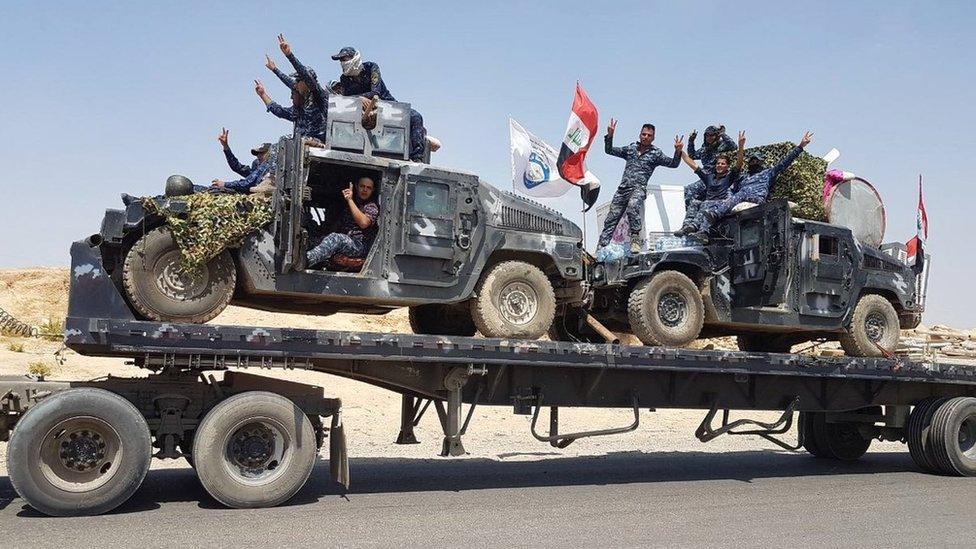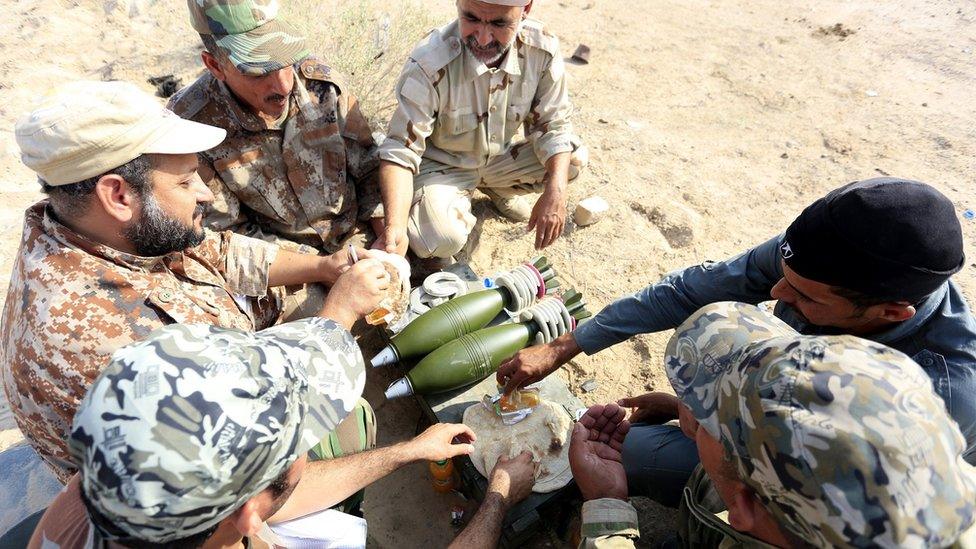IS conflict: Iraqi jets bomb Tal Afar ahead of ground assault
- Published

The Iraqi federal police said armoured and special forces units were "regrouping" outside Tal Afar
Iraqi warplanes are bombarding the jihadist group Islamic State's positions in Tal Afar, in preparation for a ground assault on the town.
Tal Afar became the last IS stronghold in northern Iraq in July after the government declared victory in the city of Mosul, 55km (35 miles) to the east.
It is not known when the offensive will begin, but army, police and special forces units are heading to the town.
Thousands of civilians have meanwhile fled the area, according to the UN.
Tal Afar, which had a predominantly ethnic Turkmen population of 200,000 before it fell to IS in June 2014, sits on a major road between Mosul and the Syrian border that was once a key supply route for the jihadist group.
In November 2016, a month after the launch of the Mosul offensive, the Shia-led paramilitary Popular Mobilisation (Hashd al-Shaabi) force took the road to the west of the town and captured an airbase just to the south.

Shia paramilitary fighters - seen here during an exercise in Najaf - have helped surround Tal Afar
The route was later severed on the eastern side of Tal Afar as troops sought to prevent IS sending reinforcements and supplies to Mosul.
Federal police chief Lt Gen Raed Shakir Jawdat discussed plans to retake the town on Monday, saying armoured and elite units were "regrouping in combat positions".
Popular Mobilisation spokesman Ahmed al-Assadi told AFP news agency on Tuesday that its commanders had met their army and police counterparts to "decide on the plan to free Tal Afar".
Although the bombardment of the town by Iraqi air force and US-led coalition warplanes has intensified in recent days, targeting IS headquarters, tunnels and weapons stores, there are no indications as to when Prime Minister Haider al-Abadi might announce the start of the assault.
However, an unnamed officer overseeing the operation told, external the Associated Press that troops were not expected to push into Tal Afar for another few weeks.

Last month, a senior Iraqi commander who once served as mayor of Tal Afar said between 1,500 and 2,000 militants and their family members were holed up inside the town.
Maj-Gen Najm al-Jabouri told, external Reuters news agency the jihadists were "worn out and demoralised" and that he did not expect a fierce battle for the town like the one for Mosul, which lasted almost nine months and took a heavy toll on Iraqi forces.
He described the terrain in Tal Afar as "favourable" to Iraqi forces, noting that only one part of the town had narrow streets comparable to those seen in Mosul's Old City. Few civilians are believed to be left in Tal Afar, with 49,000 having fled since April.
UN Humanitarian Co-ordinator Lise Grande described the conditions in Tal Afar as "very tough", with shortages of food and water, and said civilians escaping were having to walk for up to 20 hours to reach safety and assistance.
Neighbouring Turkey has said it will be watching the operation in Tal Afar closely. The town was once home to a sizeable ethnic Turkmen community and Turkish officials have expressed concern that Iraqi Kurdish and Shia Arab forces may attempt to prevent them returning once it is recaptured.
Beside Tal Afar, IS controls territory around Hawija, 170km (105 miles) to the south-east; and from Ana to Al-Qaim in the Euphrates river valley, 220km to the south.
In a separate development on Wednesday, officials said seven Iraqi security personnel had been killed in an attack by five suicide bombers wearing explosive belts in the Baiji region, 175km south-east of Tal Afar.